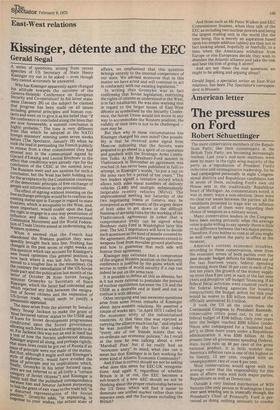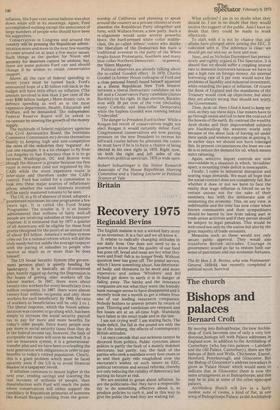The pressures on Ford
Robert Sehuettinger
The more conservative members of the Republican Party: like their counterparts in the British Tory Party, are becoming increasingly restless. Last year's mid-term elections were seen by many in the right-wing majority of the party as a repudiation of President Ford's indecisive and unimaginative leadership, for he had campaigned personally in eight Congressional districts and Republican candidates lost in seven of them, including Ford's own old House seat in the traditionally Republican heart of Michigan. As commentators noted, it was in many ways a non-election: there were no clear-cut issues between the parties; all the candidates promised to wage war on inflation but almost all of them were regarding their choice of weapons as a military secret.
Many conservative leaders in the Congress have been saying privately what the average voter is quite willing to say openly: there is little or no difference between the two major parties. Therefore, if you bother to vote at all you might as well vote against the party in office at the moment.
America's current economic troubles, according to these conservatives, stem from the economic errors of both parties over the past decade: budget deficits for thirteen out of the last fourteen years; federal spending increasing more than 10 per cent in each of the last ten years; the growth of the money supply up more than 6 per cent in each of the last nine years and deceptive 'off-budget' financing. If all federal fiscal activities were counted (such as the federal lending agencies for housing construction) the budget deficit for this year would be nearer to $20 billion instead of the officially announced $3.5 billion.
It took the US all the years from the Continental Congress to President Kennedy, conservative critics point out, to run up a federal budget of $100 billion. Only nine years later the budget reached $200 billion (under Nixon who campaigned for a 'balanced budget'); in three more years under a Republican administration it was $300 billion. At the present time all government spending (federal, state, local) eats up 40 per cent of the gross national product. It is little wonder that America's inflation rate is one of the highest in its history, 12 per cent, coupled with an unemployment rate of over 6 per cent.
Most conservatives would agree with the average voter that the responsibility for this state of affairs rests with both major parties, Republicans as well as Democrats.
Outside a very limited distribution of WIN buttons (the only person in Washington I have ever seen wearing one is, ironically enough, the President's Chief of Protocol!), Ford is perceived as doing nothing seriously to combat inflation. His 5 per cent surtax balloon was shot down while still in its moorings. Again, Ford accomplished nothing except the annoyance of large numbers of people who should have been his supporters. ConkerVatives in Congress and around the .country will be pressing the Republican administration more and more in the next few months to come around on at least a few major issues. Such things as the pardon for Nixon and amnesty for deserters cannot be undone, but there are some policies Ford can and should change if he wishes to retain conservative support.
' Above all the rate of federal spending in recent years must be turned back. Ford's announced hope of a $5 billion roll-back in the budget will have little effect on inflation. (The amount involved is less than 2 per cent of the over $300 billion budget.) More drastic cuts, in defence spending as well as in the most expensive department, Health, Education and Welfare, will be demanded. The independent Federal Reserve Board will be asked to co-operate by slowing the growth of the money supply. The multitude of federal regulatory agencies (the Civil Aeronautics Board, the Interstate Commerce Commission etc) devote themselves iainly to keeping high and non-competitive the rates of the industries they 'regulate'. As just one example, it is a lot cheaper to fly from Los Angeles to San Francisco than it is to go between Washington, DC and Boston even ---:_though the distance is greater because the first route is intro-state (and not regulated by the CAB) while the more expensive route is 7 inter-state and therefore under the CAB's
/ control. Ford has called for a commission to look into these major sources of inflationary prices; whether the vested interests involved will be easily mastered remains to be seen. The US, in a fit of absence of mind, adopted a
„.<" guaranteed minimum income programme a few years ago. It is called the Food Stamp Programme. The trouble is, it is so loosely administered that millions of fairly well-off people are receiving subsidies at the taxpayers' expense. It is estimated that by 1977 a quarter of all Americans will be eligible for these food grants (designed for the poor) at an annual cost of about $15 billion. America's welfare system cries out for a rational reform which will aid the truly needy but not saddle the average taxpayer with the paying of subsidies to people who receive as much as or more than he does himself.
The US Social Security System (the government pension plan) is quietly heading for bankruptcy. It is basically an ill-conceived plan, hastily rigged up during the Depression in the hopes of getting older workers off the labour market. In 1947, there were about twenty-two workers for every beneficiary (two million recipients). In 1967, there were almost twenty-four million recipients and only three workers for each beneficiary. By 1980, the ratio of workers to beneficiaries will be only 2 to 1. The liberal response, which the Nixon administration was content to go along with, has been simply to increase the social security payroll tax to pay for more and more benefits for today's older people. Since many people now pay more in social security taxes than they do in the federal income tax, however, the limit of acceptable tax raises will soon be reached. It is • not an insurance system, it is a generationaltransfer plan and we have been overloading the next generation with obligations in order to pay benefits to today's retired population. Clearly, this is a giant problem which must be faced squarely soon if the US is to avoid financial disaster or a taxpayers' revolt.
If inflation continues to mount higher in the next year, eroding savings and lowering the real incomes of millions of people, then dissatisfaction with Ford will reach the point where conservatives will either support the candidacy in Republican primaries of someone like Ronald Reagan (retiring from the gover
norship of California and planning to speak around the country as a private citizen) or even abandon the Republican Party altogether and form, with Wallace forces, a new party. Such a re-alignment would unite several powerful blocs: the hard-pressed white collar middleclass, the so-called 'ethnic' voters who dislike the liberalism of the Democrats but have a traditional aversion to the party of the White Anglo-Saxon Protestants, Southern and many blue-collar Northern Democrats. . . in general, the 'Silent Majority.'
Political observers are already talking about the so-called 'Goodell effect.' In 1970, Charles Goodell (a former House colleague of Ford and a close personal friend) found himself squeezed as a liberal Republican New York Senator between a liberal Democratic candidate on his left and a Conservative Party candidate (James Buckley) on his right. In that election, Buckley won with 39 per cent of the vote (including many Catholic and blue-collar Democrats) while the hapless Goodell was running behind 'Undecided.'
The danger to President Ford is clear. While a Reagan-led revolt of conservatives might not elect Reagan it would certainly defeat Ford. Congressional conservatives are now putting pressure on the new President to reverse his leftward course before he alienates the voters he must have if he is to have a chance of being elected in his own right in 1976. Right now, on both the right and left sides of the American political spectrum, 1976 is wide open.
Robert Schuettinger is the Senior Research Associate of the House Republican Steering Committee and a Visiting Lecturer in Political Science at Yale
Britain



































 Previous page
Previous page